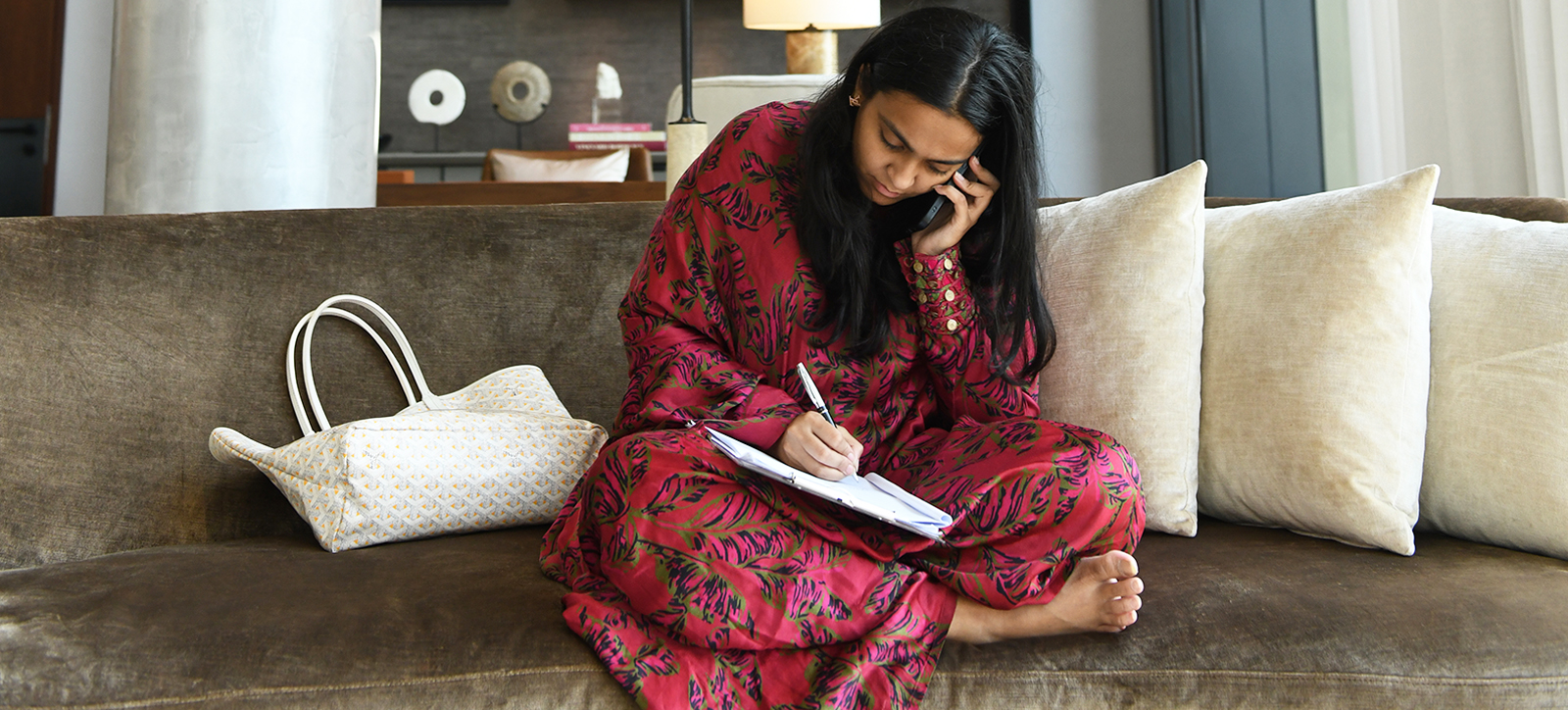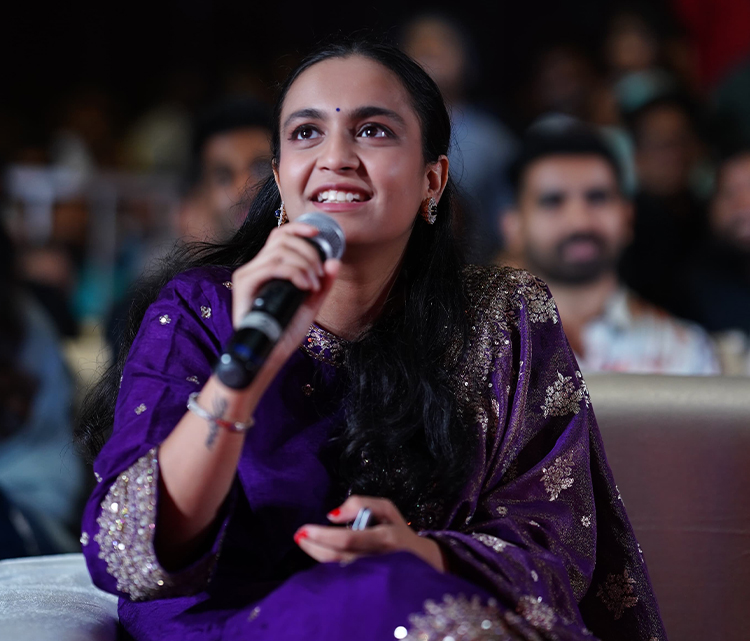
Flipping the switches: Jhanvi Narang is applying her marketing skills to the Telegu film industry
There is a casual arrogance to the term ‘Bollywood’, having swollen in the Western imagination into a shorthand for all Indian cinema.
You see, while Bollywood (Hindi-language cinema from Mumbai) and its stars have long enjoyed global headlines, red carpets, and Nick Jonas, if you look south to Hyderabad, you’ll find a different kind of cinema: louder, more expansive, and daringly epic in scale.
Telugu cinema – aka ‘Tollywood’ – is not simply a regional curiosity or late-breaking rival. It’s been producing films at an astonishing rate since the 1930s, building, in the process, its own stars, rituals, and cinematic grammar.
What’s on screen is dazzling, but long before the cameras roll, someone has to build the stage, wire the lights and switch on the power. That is where the Narangs come in – a family who have spent decades shaping the infrastructure of Telugu cinema. When the spotlight hits, it is often because they have made sure there was a light to point and a switch to flick.
In fact, flicking switches was Warwick Business School alum, Jhanvi Narang’s first role in the business.
“I spent a lot of my childhood turning on cameras,” says Jhanvi, who completed her MSc Business with Marketing in 2020 and is now Producer and Chief Marketing Officer (CMO) at Asian Cinemas.
“It was a superstitious thing for my grandfather.”
There’s a fair amount of that – superstition – in Telugu cinema. Films aren’t just put into production, they are launched with pujas, encouraging divine intervention at the box office.
Those ceremonies were the backdrop of Jhanvi’s childhood given her grandfather is Narayan Das Narang, and her father Asian Suniel – both titans of the industry.

And yet, despite the pedigree, entering the family business was not a foregone conclusion.
“They never forced it,” she says. “I studied economics before I studied marketing at Warwick, and they were okay with me doing anything. I pulled myself into it.”
That pull gathered momentum in the pandemic.
“It was mid-COVID and I was back home from Warwick. I had studied a lot, learned a lot, and I was just waiting to apply my marketing skills somewhere. I saw that opportunity in a film we were producing. I really felt the push.”
And that’s where she’s happiest, guiding films into the world.
“My blood pumps faster when I’m marketing a film,” she says. “I think the excitement comes from being able to do new things, ideas that are completely up to me. It’s something I could do 24 hours a day.”
Know your audience
It is striking to hear a young CMO talk beyond data points and dashboards, instead emphasising a refreshing respect for instinct, culture, and mood.
“It's not fair to say that no data goes into it – especially now with AI and tech ruling everything – but I’d say 80 per cent of the process has to be instinctive,” Jhanvi says.
This is especially true in India’s south, she explains, where misjudging an audience can leave you embarrassed.
“You need to know your audience and remember they’re people from very different spaces to yourself," she says. “The people who stand in that line, who really get into the craze of the film, they’re the ones you need to get to – you can’t just think like yourself.
“I personally spend a lot of time talking to audiences. I have access to theatres, because I'm also an exhibitor, so I spend time going to the districts, to the towns, and meeting the audiences."
Where her grandfather built infrastructure, Jhanvi has built connections, and her work takes her into the heart of communities. She seeks out college students in the south – “a huge market” – and runs focus groups. Basically, she does the leg work – especially important given no industry on Earth is more obsessed with audience response than Indian cinema.
“Cinema is very different here in terms of consumption,” she says. “In the south of India, it's like a full-blown religion. We’ll have celebrations with fans, who are so aggressively in love with their celebrities here. They make 100-foot cut-outs of the actors. The actors are real stars, the directors are celebrities, and, if you give them something that they like, the fans will love you until the end of the world.”
Having recently launched Kuberaa – a sprawling crime drama from Director Sekhar Kammula – it is clear to see that Jhanvi is comfortable in a variety of roles.
“I feel like I’ve done every single job there is with this launch,” she says. “In terms of artwork, standing on the sets, cutting the budgets, getting it executed, auditing it… I’ve been involved in all of that.”
A massive project, with more than 100 days of shooting, it has taught her the value of patience, as well as reigniting her love of creatives. She likens working with Kammula to spending a year at film school and those lessons will no doubt be useful in her upcoming movie, Premante – her first official Producer credit.
That project feels the next logical step for someone whose win at The Times Power Awards in 2019 prompted her father to tell her to “go out and do better”.
The expectations are high, but so is her work rate, with 15-hour days the norm.
Avoiding work is tricky too, especially when little other than film is discussed at the dinner table. A recent family holiday was dominated by talk of an upcoming release. “It became more of a work environment,” she jokes.
“I think the film industry is over-glamourised from the people outside looking in,” she says. “In reality, it's a lot of hard work. I think you have to live, breathe, and eat cinema. Don't come into it if you're not passionate.”
Warwick alumni community
In an industry making the loudest of films, Jhanvi is finding her own voice. She credits the friendships and independence she gained at Warwick as crucial in shaping her self-confidence and professional identity.
“My time in cinema taught me resilience, but Warwick taught me life,” she says, as she fondly recalls a mixture of memories – academic and personal – including lectures with Hugh Wilson, Professor of Marketing, postgraduate parties, aggressive geese, and an abundance of shopping trollies.
She is fiercely proud to be a part of the Warwick alumni community, with regular open channels of communication between her and friends from campus.
“We were only together for about six or seven months because of COVID, but that bond, it’s lasted," she says. "We have this beautiful friendship and we’re always around for each other.”
Looking to the future, she wants an Oscar eventually, but mostly she wants to honour the legacy her grandfather and father have built – brick by brick and reel by reel.
It’s fitting, really: the girl who grew up on set isn’t chasing the spotlight; she’s more comfortable backstage, making sure the switches are still being flipped.
Discover more about Warwick Business School’s Master's Courses.
Discover Warwick Business School's Change Makers.




 X
X Facebook
Facebook LinkedIn
LinkedIn YouTube
YouTube Instagram
Instagram Tiktok
Tiktok